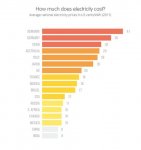- Joined
- Dec 22, 2012
- Messages
- 66,544
- Reaction score
- 22,186
- Location
- Portlandia
- Gender
- Male
- Political Leaning
- Libertarian - Right
That is absolutely not true.According to the International Monetary Fund (IMF) the estimate subsidies for fossil fuel is 5.3 trillion dollars a year.
Look at the definition of "subsidy" and try to replicate their number. You wont be able to. Don't use any dictionary, use a reputable one like Merriam Webster.
There is a clean burning technology available. Sure, it still pollutes a little, but not like in the past. Many sites in the USA have been given several years to modify, or close. There is insight to the actual problems, and the understanding that it takes years rather than overnight to change. The extra authoritarian push is not needed, and very harmful to our economy.
There most of the sum is that polluters not paying the costs imposed on governments by the burning of coal, oil and gas. Both harm caused to local populations by air pollution as well as to people across the globe affected by natural disasters driven by climate change.
https://www.theguardian.com/environ...es-getting-10m-a-minute-in-subsidies-says-imf
[/QUOTE]
Oh please...
The Guardian?
Don't get me started with they lack of ethics, and their push for agenda over truth.
The flow of oil from the middle east is not a factor. Only real ignorant people to the facts and believers of political forces think the middle east matters when it comes to first world oil needs.On top of that you have the cost of being dependent on and protecting the flow of oil cheap from the Middle East. There the cost of Iraq have been over 2 trillion dollars and risk grow to 6 trillion dollars.
Not a valid argument to this thread. Why re you comparing apples to oranges?Iraq war costs U.S. more than $2 trillion: study | Reuters
Western countries dependency on cheap oil also leads to that they support and sell arms to brutal and authoritarian regimes. That USA even have military bases in Saudi Arabia one of the worlds most brutale and authoritarian dicatorships.
https://www.hrw.org/world-report/2017/country-chapters/saudi-arabia
Cheaper energy?While renewable energy can also have other benefits than reducing pollution and cheaper energy.
What are you smoking. I would like some!
Big energy will always do what is best to stay profitable. If wind and solar were more profitable, they would be building it like crazy. The fact that they don't, should be a very loud and clear message that fossil fuels are more profitable.That it can also can lead to that people, communities and country can gain more energy indepedence. That people and local communities can be less dependent on big energy companies for their energy needs.
We actually have huge fossil fuel resources in the states. The reason we buy from other countries is that every time we do something to use more of our own oil, OPEC et. al. reduces their prices to keep selling theirs.
What we need is to modify all these free trade agreements we have.
Europe does it by imposing dramatic sin taxes on theor gasoline and other oil products.While European countries can be less dependent on fossil gas from Russia and oil from the Middle East, while USA can also become less dependent on oil from the Middle East.
Do you want to pay $8 per gallon for gasoline?
Again...
Comparing Europe to the USA...
Very silly notion, unless you wish to implement a similar tax structure.

